15th January 2024
#ID Culture: Automated Life - Seeking Humanised Experiences
Mindshare’s #ID Culture: Automated Life report explores consumers' attitudes towards AI.
The research shows that people want to use AI technologies to improve their lives. They’re using gadgets and apps to enhance how they live and make choices, becoming a bigger part of their daily routines.
AI-driven technologies can bring lots of possibilities, despite concerns about their impact on society. With increasing awareness among the mainstream population regarding the ethical use of AI, there are more initiatives from brands and business to make it more human-friendly and aligned with new regulations.
People are excited about the endless opportunities of automated technologies, which are also reshaping people's expectations when engaging with brands. In a world with information overload and desire for instant gratification, efficiency through automation has become the baseline expectation for consumers.
Mindshare delved deeper into the consumer behaviour and culture of automation in people’s lifestyles and identified five key mindsets.
1. Smarter not harder
People are experiencing burnout from the abundance of choices and digital fatigue and wish to simplify their lifestyles to enjoy the things they love. They are aware of the value of time and how much of it can end up being spent on tasks such as chores, with 51% saying they would like to automate everyday tasks/chores to have more free time for themselves and their family. Automation is not just about making tasks more efficient; it can also simplify decision-making and reduce stress to free up mental space and focus on more important tasks – 46% are looking for digital technologies and solutions to help streamline their decisions.
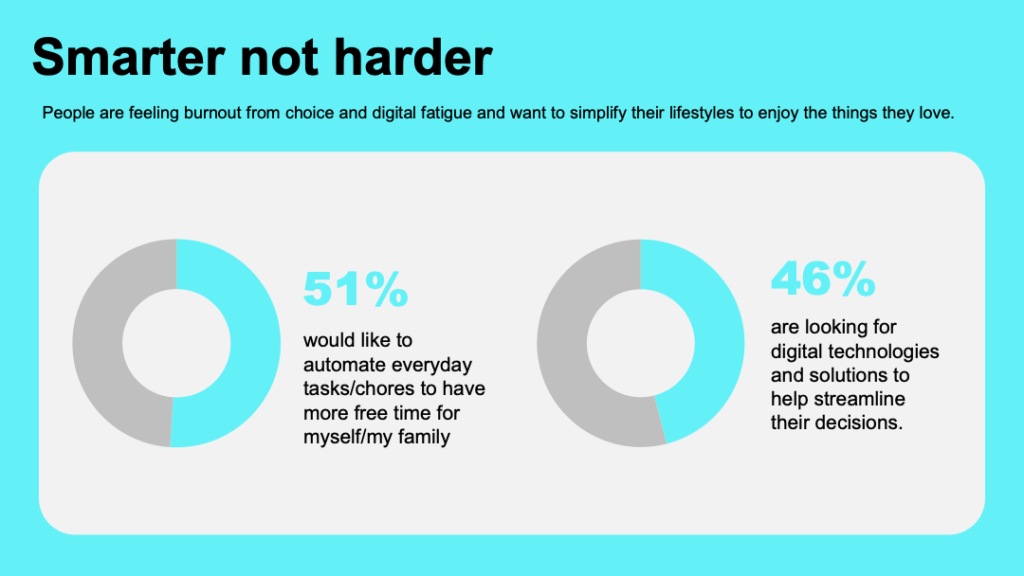
2. Unpredictable choices
People are embracing algorithm recommendations with 41% of global respondents stating they are prepared to share their personal data with brands for an easy and convenient shopping experience. Automation is creating a desire and an expectation for personalisation in the shopping ecosystem both online and in-store, 57% would like to have personalised products/experiences in physical stores. Whilst personalisation brings efficiency to consumers, at the same time, people want to have more serendipity in their lives, with more unpredictable and unexpected experiences. When it comes to media content, 55% of people want streaming platforms to suggest new and unexpected content to watch or listen to.
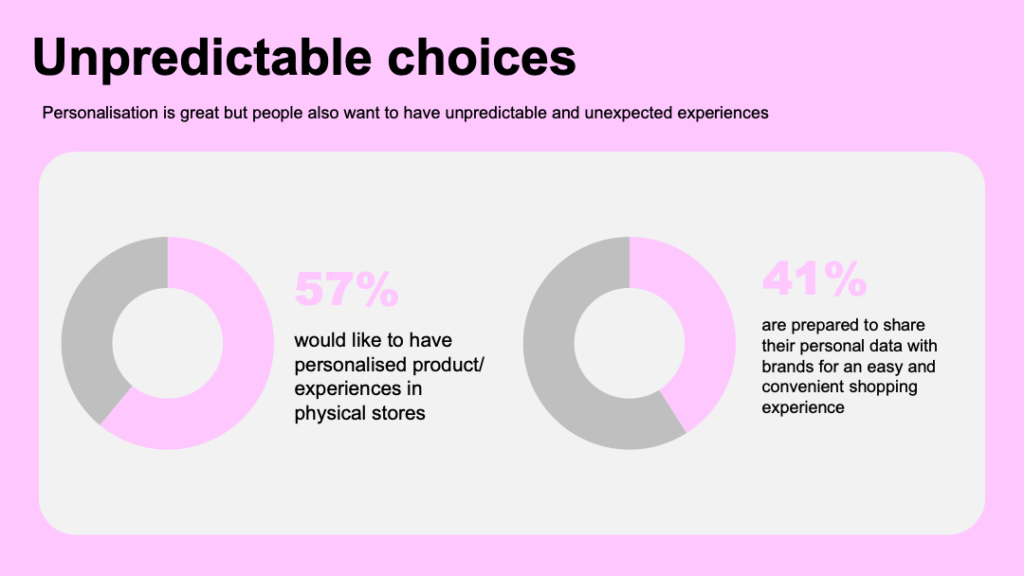
3. All-in-one
Many people are 'e-com' first, leading to 52% who are happy to simplify their online shopping experiences and get everything delivered from one place, such as Amazon. Consumers are willing to surrender to online megasystems but still seek experiences that make them feel exclusive and special. This is evident despite the decline of small businesses and high street experiences. with 50% of people saying that independent or niche brands or retail store purchase experiences feel more special than buying from mega retailers.
The proliferation and continuous growth of streaming platforms is impacting consumers, who are feeling overwhelmed and experiencing content fatigue. 63% said there are too many streaming services to choose from. Consumers are demanding more streamlined access to content; therefore, new platforms are emerging to incorporate all streaming content in one place, as media is more fragmented than ever before.
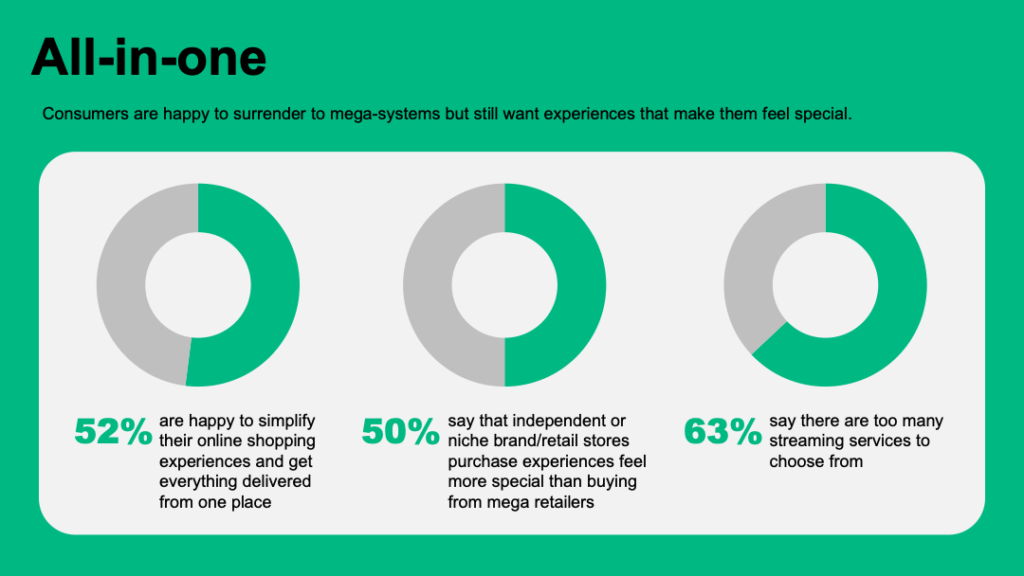
4. Power struggle
As technology becomes more embedded in our lives, there are concerns that we are becoming overly dependent, unable to learn new things or think for ourselves, with 54% of consumers believing that smart technologies will take our lives. The very tools designed to empower us has the potential to take control of our lives, shaping our habits and influencing our decisions. However, automation bring endless positive experiences for consumers and our societies – 50% can't imagine a world without the commodities that digital technologies bring to our lives. For example, people now have more control over their lifestyle in key areas such as living more sustainably. AI and automation can break down barriers and empower both able-bodied and disabled people alike, enabling them to lead more enhanced lives free from limitations or barriers to accessibility. It can also bring solutions and safe experiences to people’s lives.
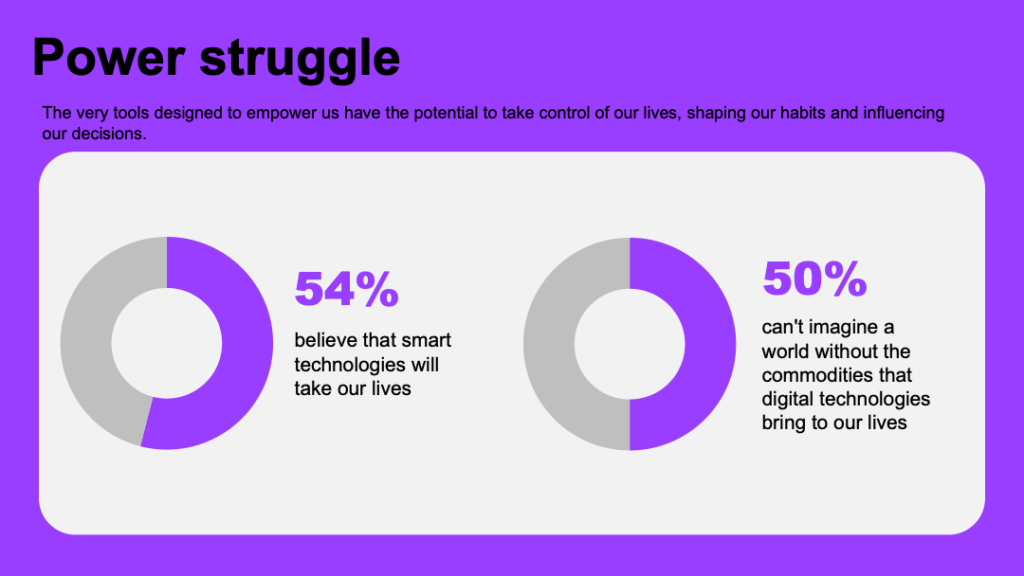
5. Meaningful experiences
Physical stores still play a significant role in the shopping experience, as 72% enjoy going out shopping to physical stores to see and touch the products they want to buy. While retail brands adopt more technology, human engagement remains key; 69% of people prefer interacting with brands in person rather than through chatbots or automated responses on their websites/apps. The high street, markets, and all physical stores can offer a more unique and human experience. Being there physically provides the perfect opportunity to layer seamless physical-digital experiences and engage shoppers at every stage of the consumer journey.
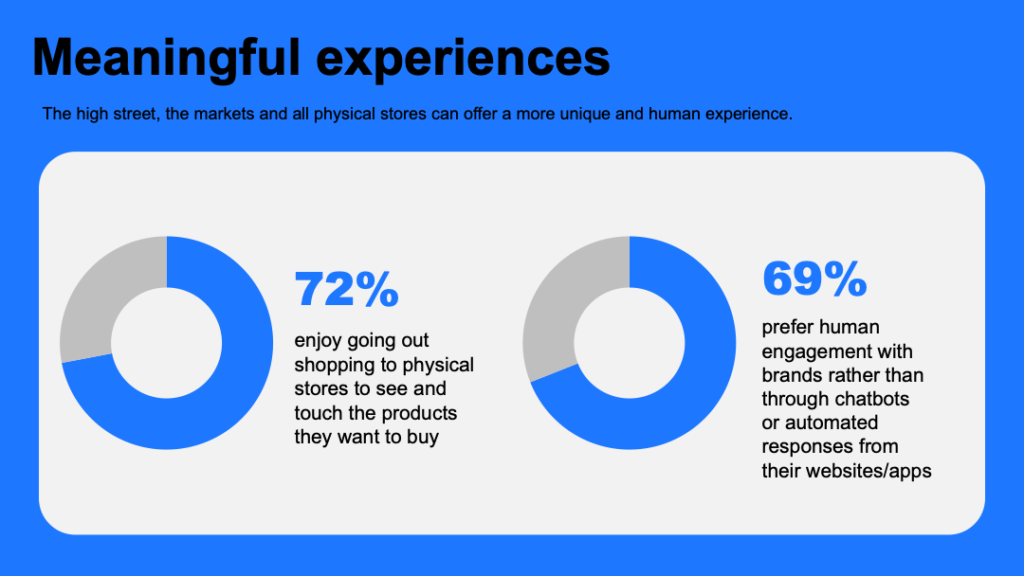
How can brands humanise AI-driven experiences for consumers?
Brands need to ensure that automation is used correctly. If they rely too heavily on automated responses and don’t provide opportunities for human interaction, customers may feel disconnected and disengaged from the brand. If automated processes are not personalised or relevant to the customer's needs, they maybe be ignored.
Brands need to find the right balance by integrating efficiency and personalisation with the human touch for deeper emotional connections. They should also bring novelty and a sense of discovery to increase enjoyment throughout the consumer journey.
Provide consumers with the control to decide their automated experiences using user-friendly technologies, so they can feel empowered. Also, make them feel valued beyond automation through brand experiences they can encounter in physical environments.
The goal is to differentiate the brand, build trust, and adapt to customer preferences, creating a well-rounded experience that goes above and beyond automated interactions.
Source: #ID Culture, Automated Life (Mindshare Global Tracker Survey, Wave 3, 2023 – 12 markets).
For more information please contact: [email protected], [email protected]